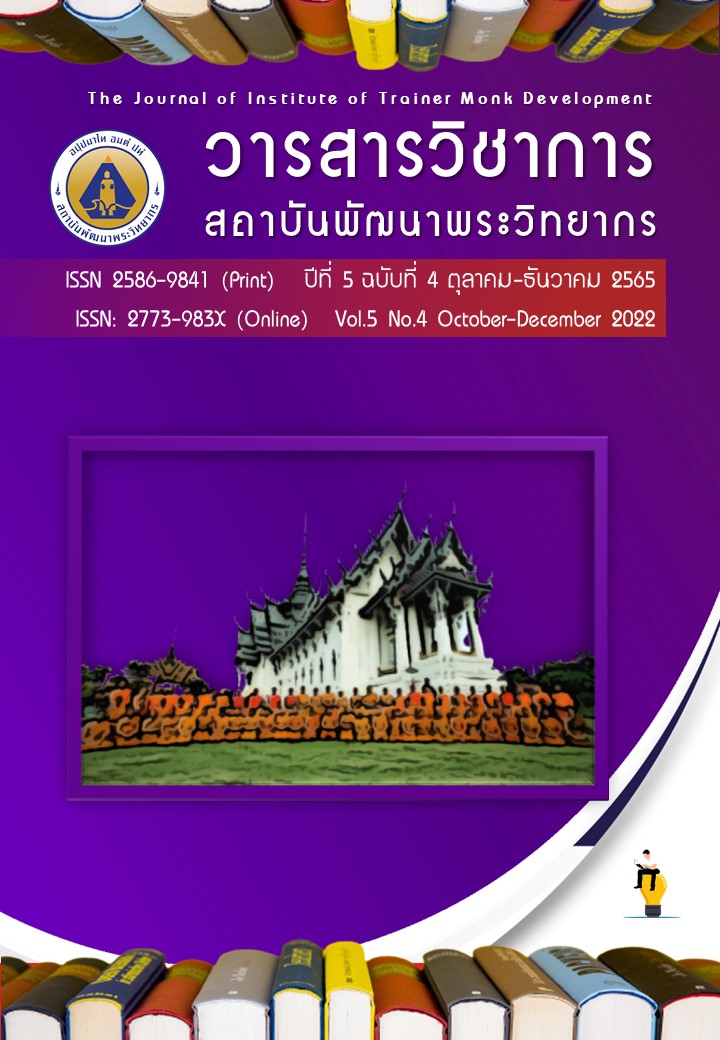An Influence of Appamadadhamma Doctrine on the coping with COVID-19
Main Article Content
Abstract
This article has two objectives to study a concept of Appamadadhamma Doctrine and to critically analyze an influence of Appamadadhamma doctrine on the coping with COVID-19. This article employed the documentary research methodology. In the research, it was found that a concept of Appamadadhamma with epistemological approach presented to know information by the mindfulness because perception in Buddhism refers to the external world. Actually, humans perceive the external world through their senses is considered to be directly understanding the world, such as the Buddha and the Arhat. In the other word, worldly person could understand everything by sensation. The ethical approach is to use mindfulness to determine what happens to us and to use effort to cure health when the disease occurs to oneself.
In the COVID-19, non-negligence used to understand many information in news carefully of diseases and treatments them. In ethical approach, it occurs in living both in terms of acknowledging that physical disease is important to the mind and insight practice, it is necessary to be mindfulness and to maintain a strong physical and mental health which not to be depressed and ready to resolve problems by myself.
Article Details

This work is licensed under a Creative Commons Attribution-NonCommercial-NoDerivatives 4.0 International License.
บทความที่ได้รับการตีพิมพ์เป็นลิขสิทธิ์ของวารสารวิชาการสถาบันพัฒนาพระวิทยากร
ข้อความที่ปรากฎอยู่ในบทความที่ได้รับการตีพิมพ์ในวารสาร ถือเป็นความรับผิดชอบของผู้เขียนบทความ และข้อคิดเห็นนั้นไม่ถือว่าเป็นทัศนะและความรับผิดชอบของกองบรรณาธิการวารสารวิชาการสถาบันพัฒนาพระวิทยากร
References
กระทรวงสาธารณะสุขแห่งประเทศไทย. (2563). “รายงานสถานการณ์โดยองค์การอนามัยโลก (WHO) ประเทศไทย”. สืบค้นเมื่อวันที่ 20 พฤศจิกายน 2565 จาก: 20200310-tha-sitrep-17-covid19-thai-final.pdf (who.int).
ณัฏฐวรรณ คำแสน. (2564). ความรู้ ทัศนคติ และพฤติกรรมในการป้องกันตนเองจากการติดเชื้อไวรัสโควิด-19ของประชาชนในเขตอำเภออู่ทอง จังหวัดสุพรรณบุรี. วารสารวิทยาลัยพยาบาลพระจอมเกล้า จังหวัดเพชรบุรี. ปีที่ 4 ฉบับที่ 1 (มกราคม-เมษายน), 35: (33-48).
ปรีชา ช้างขวัญยืน, สมภาร พรมทา. (2552). มนุษย์กับศาสนา. พิมพ์ครั้งที่ 4. กรุงเทพมหานคร: โครงการเผยแพร่ผลงานวิชาการ คณะอักษรศาสตร์ จุฬาลงกรณ์มหาวิทยาลัย.
พระพรหมคุณาภรณ์ (ป.อ.ปยุตฺโต). (2557). ลักษณะแห่งพระพุทธศาสนา. พิมพ์ครั้งที่ 31. นครปฐม: บริษัท จ. เจริญ อินเตอร์พริ้น ประเทศไทย จำกัด.
พระพรหมคุณาภรณ์ (ป.อ.ปยุตฺโต). (2559). พจนานุกรมพุทธศาสตร์ ฉบับประมวลธรรม. พิมพ์ครั้งที่ 34. กรุงเทพมหานคร: ผลิธัมม์.
พระพรหมบัณฑิต. (2561). พระไตรปิฎกฉบับสากล: วิถีธรรมจากพุทธปัญญา. พระนครศรีอยุธยา: มหาวิทยาลัยมหาจุฬาลงกรณราชวิทยาลัย.
มหาจุฬาลงกรณราชวิทยาลัย. (2539). พระไตรปิฎกภาษาไทย ฉบับมหาจุฬาลงกรณราชวิทยาลัย. กรุงเทพมหานคร: โรงพิมพ์มหาจุฬาลงกรณราชวิทยาลัย.
สุวิทย์ เมษินทรีย์. (2563). โลกเปลี่ยนคนปรับ หลุดจากกับดักขยับสู่ความยั่งยืน. กรุงเทพมหานคร: กระทรวงอุดมการณ์ศึกษา วิทยาศาสตร์ วิจัยและนวัตกรรม.
วิทย์ วิศทเวทย์. (2532). จริยศาสตร์เบื้องต้น มนุษย์กับปัญหาจริยธรรม. พิมพ์ครั้งที่ 7. กรุงเทพมหานคร: โรงพิมพ์อักษรเจริญทัศน์.
CP Inno Expo. (2563). โควิด 19 กับพฤติกรรม New Normal มาตรฐานวิถีชีวิตใหม่ในวันนี้และตลอดไป. สืบค้นเมื่อวันที่ 18 พฤศจิกายน 2565 จาก: https://www.wearecp.com/new-normal-190563
Damien Keown. (1992). The Nature of Buddhist Ethics. New York: Palgrave Macmillan.
Damien Keown. (1995). Buddhism and Biothics. New York: St.Martin Press.


